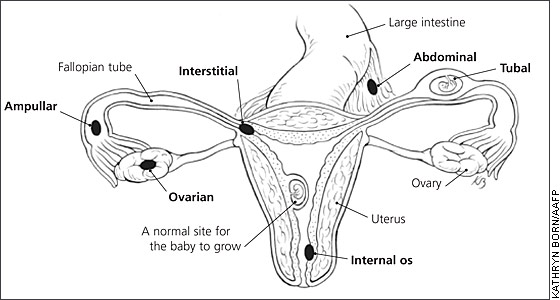
Am Fam Physician. 2005;72(9):1719-1720
See related article on ectopic pregnancy.
What is an ectopic pregnancy?
An ectopic (say: ek-TOP-ik) pregnancy is when the baby grows in the wrong place in the body. In a normal pregnancy, the baby grows in the uterus. In an ectopic pregnancy, the baby grows outside the uterus (see drawing), which is not safe. It is important to find the ectopic pregnancy before there are problems.

Who has ectopic pregnancies?
Anyone who can get pregnant can have an ectopic pregnancy. You are more likely to have an ectopic pregnancy if you are between 35 and 44 years of age and have had infections or operations in the pelvic area (inside your body, below your belly button). If you smoke or have had trouble getting pregnant, you also are more likely to have an ectopic pregnancy.
How do I know if I have an ectopic pregnancy?
If you have an ectopic pregnancy, you may have normal signs of pregnancy (missed periods, sore breasts, upset stomach). You may not have any signs at all. Other signs of ectopic pregnancy are pain and vaginal bleeding. You also may feel a sharp or stabbing pain in your stomach or on one side of your pelvis. If you bleed too much, you may feel weak or dizzy and you could pass out. Your doctor can do a test to check for an ectopic pregnancy.
What should I do if I have ectopic pregnancy?
Your doctor can give you medicine to stop the pregnancy, but you may need an operation.
Will I have an ectopic pregnancy if I get pregnant again?
If you have had an ectopic pregnancy, you are more likely to have another one. You also may have trouble getting pregnant again. You should give yourself time to heal before you try to get pregnant after having an ectopic pregnancy.